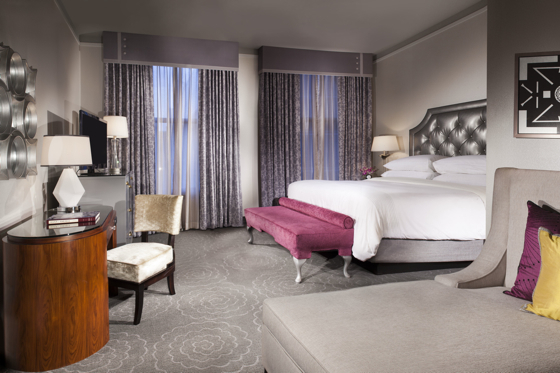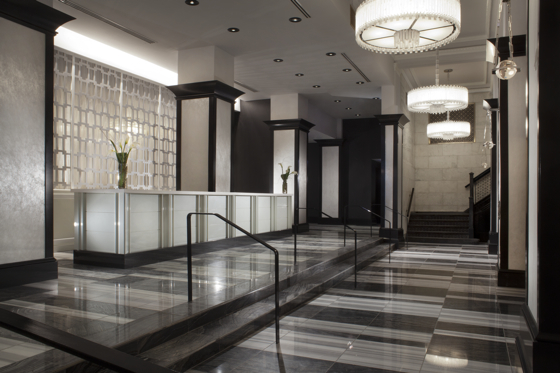Chicago’s Silversmith Hotel, located in downtown’s Jewelers Row district a block west of Michigan Avenue and a block east of State Street, dates back to 1896 and is listed on the U.S. National Register of Historic Places. However, owner Ashford Hospitality Trust and management company Remington Hotels decided the 144-room property was a gem in need of a makeover. Directed by Leo A Daly, the renovation includes all guestrooms as well as a new lounge and restaurant, Adamus, a fitness center and banquet space.
HOTELS sat down with General Manager Hans Ritten to discuss the main goals of the revamp and his thoughts about the boutique luxury space in general.
HOTELS: Talk about the decision to reposition this property as a luxury independent boutique hotel.

Hans Ritten: There are enough branded products in this market. [The owners and management company] felt with this being a historic building, an independent luxury boutique hotel would really fit in. Also, with it being on Jewelers Row, this being the Silversmith building, they wanted to keep the name Silversmith.
All 144 guestrooms were renovated in phases. The rooms are oversized rooms with oversized bathrooms and high ceilings.

We also renovated our F&B space, which was previously a deli, and decided to make it Adamus. Adamus is Greek for diamond. We really want to emphasize Jewelers Row, because it’s such a historic part of Chicago. In the design, our main color is silver-gray. If you look at the lamps next to the elevators, they resemble the chain of a necklace, so there’s a lot of detail that goes back to jewelry.

Our drinks of the month are named after that month’s birthstone, so there are a lot of different twists we have incorporated.
Our tagline is “luxury recut.” It’s beautiful, it’s elegant — it’s the new shining diamond in the Loop. It’s not only physical, but also in our services. We will introduce seamless check-in, where guests will be escorted to the room rather than going to the front desk and getting a key. Our room service is not a traditional table with hot box and tablecloth; it will be done in a very elegant box and delivered quickly — still a great menu with great ingredients, but we feel nowadays the needs of room service have changed. The less intrusive it is, if it’s a great product, the better. And the price points will be exactly the same as in the restaurant.
There’s nothing wrong with traditional luxury, but luxury can be casual.
HOTELS: What is your guest mix like?
Ritten: Midweek is business travelers. There are a lot of corporations in our neighborhood, and that’s our main target — the transient business traveler — midweek. Midweek it’s about 85% business.
On the weekend, it’s all about people who want to experience Chicago. We want to be part of that unique experience. It’s probably about 70% leisure on the weekend.
HOTELS: Do you expect your demographic to skew younger?
Ritten: It’s too early to tell, but it’s definitely a target group for us. The hotel has a hip feel. There is definitely a younger audience that will come, for example, in August to Lollapalooza — we absolutely want them to be part of the Silversmith experience.
HOTELS: How do you expect the renovations to impact average rate?
Ritten: Compared to the old Silversmith, we have moved ourselves to a different segment — boutique luxury — and the ADR is expected to reflect that. It’s seasonal, but the starting rates definitely will be US$229 and up.
HOTELS: How do you think your hotel can stand out both in a crowded market like Chicago and in the increasingly crowded boutique space?
Ritten: It will be a personalized experience. We will have daily arrival meetings where we go over preferences of guests. We will remove ice machines from the floors; if somebody wants ice, we will bring it up to the guest. If a garment needs to be steamed, we will steam-press their garment. All these personal touches will be added. I think that will really differentiate us.
HOTELS: How do you expect the boutique segment overall to continue to evolve going forward?
Ritten: Boutique hotels have a more flexible way of reacting to guests. Branded products are great, but sometimes they’re a little stagnant when it comes to changing certain business processes. If something isn’t working here, I don’t have to go through a corporate office. I will make it work. There are brands that tell you what liquors you have to use at the bar; here, if there is something guests would like to have, we will provide it. One of the advantages we have is more flexibility to immediately react to guest needs or market needs.
